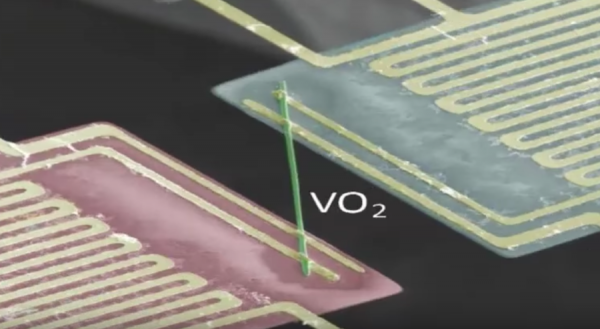By Vishal Goel, | February 01, 2017

Vanadium dioxide can conduct electricity and not heat. (YouTube)
According to a study led by scientists at the Department of Energy's Lawrence Berkeley National Laboratory and at the University of California, Berkeley, electrons in vanadium dioxide (VO2) metal can conduct electricity without conducting heat.
Most metals strictly follow the Wiedemann-Franz Law which, simply put, states that good conductors of electricity are also good conductors of heat. However, it does not apply to the metallic vanadium dioxide, which switches from an insulator to a metal when it reaches 67 degrees Celsius, or 152 degrees Fahrenheit.
Like Us on Facebook
Junqiao Wu, a physicist at Berkeley Lab's Materials Sciences Division and a UC Berkeley professor of materials science and engineering, said that this is a totally "unexpected finding" because it shows a "drastic breakdown of the textbook law."
To study the properties of vanadium dioxide, Wu and his team partnered with Olivier Delaire at DOE's Oak Ridge National Laboratory, who is an associate professor at Duke University. Using results from simulations and X-ray scattering experiments, the team was able to determine the proportion of thermal conductivity attributable to the vibration of the material's crystal lattice and to the movement of electrons, called phonons. To their surprise, they found that thermal conductivity attributed to the electrons is 10 times smaller than what would be expected from the Wiedemann-Franz Law, according to the report by Berkeley Lab.
The material's conductivity can also be fine-tuned by mixing it with other materials. When the researchers doped single crystal VO2 samples with the metallic tungsten, they lowered the phase transition temperature at which vanadium dioxide becomes metallic. At the same time, the electrons in the metallic phase also became better heat conductors. This enabled the researchers to control the amount of heat that vanadium dioxide can dissipate by switching its phase from insulator to metal and vice versa, at tunable temperatures.
Applications of the discovery
The findings, to be published in the Jan. 27 edition of the journal Science, could lead to a wide range of applications, including in thermoelectric systems which convert waste heat from engines and appliances into electricity.
Fan Yang, a postdoctoral researcher at Berkeley Lab's Molecular Foundry and a co-lead author in the study, said that the material could be used to stabilize temperature. "By tuning its thermal conductivity, the material can efficiently and automatically dissipate heat in the hot summer because it will have high thermal conductivity, but prevent heat loss in the cold winter because of its low thermal conductivity at lower temperatures," he explained.
-
Use of Coronavirus Pandemic Drones Raises Privacy Concerns: Drones Spread Fear, Local Officials Say

-
Coronavirus Hampers The Delivery Of Lockheed Martin F-35 Stealth Fighters For 2020

-
Instagram Speeds Up Plans to Add Account Memorialization Feature Due to COVID-19 Deaths

-
NASA: Perseverance Plans to Bring 'Mars Rock' to Earth in 2031

-
600 Dead And 3,000 In The Hospital as Iranians Believed Drinking High-Concentrations of Alcohol Can Cure The Coronavirus

-
600 Dead And 3,000 In The Hospital as Iranians Believed Drinking High-Concentrations of Alcohol Can Cure The Coronavirus

-
COVID-19: Doctors, Nurses Use Virtual Reality to Learn New Skills in Treating Coronavirus Patients











